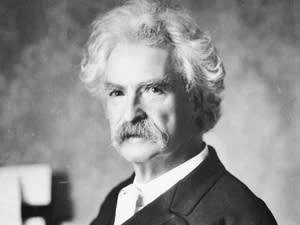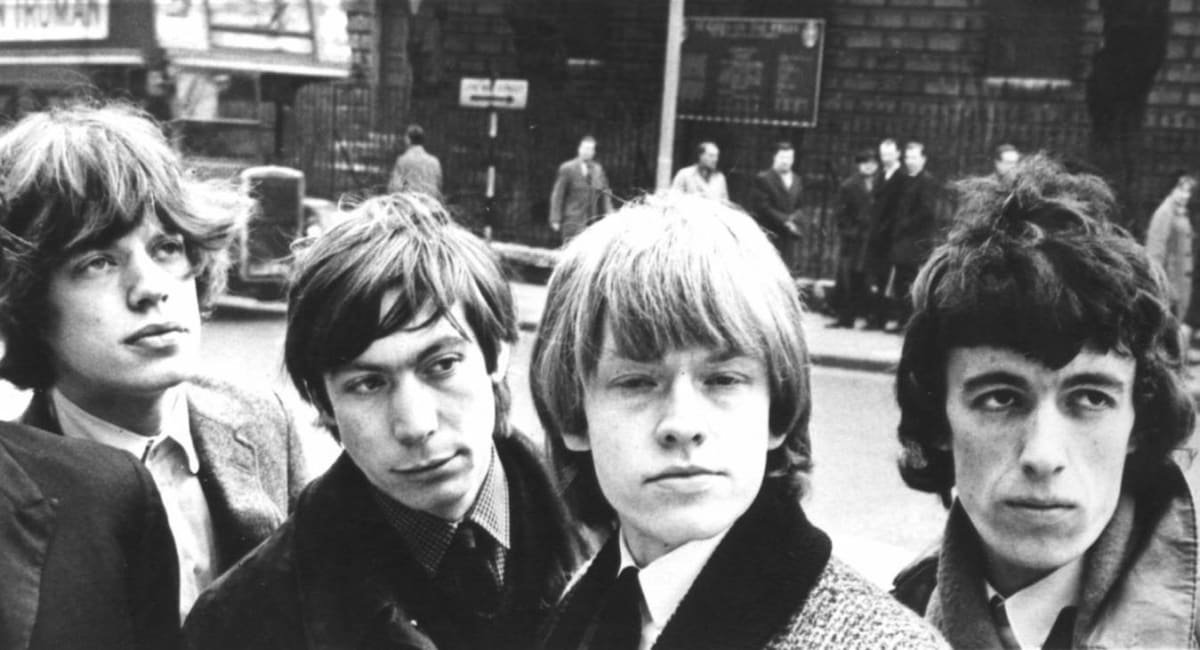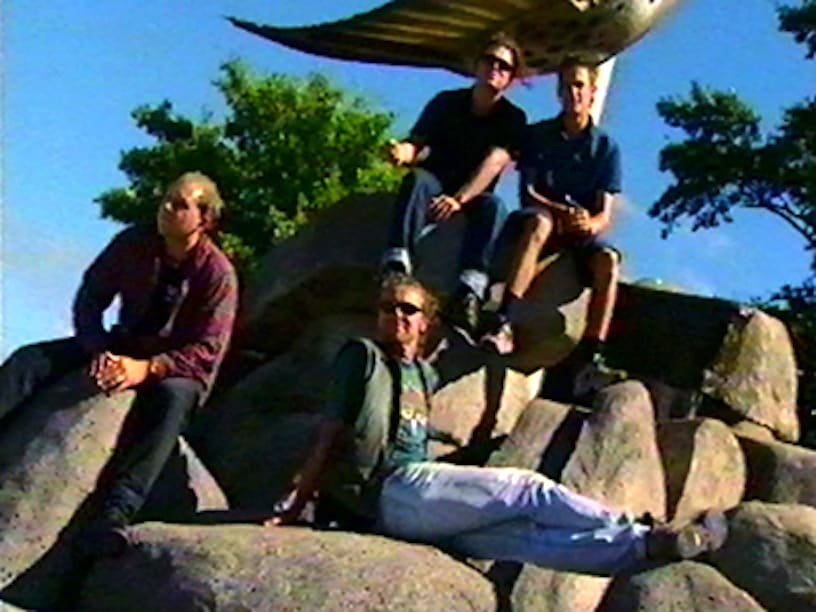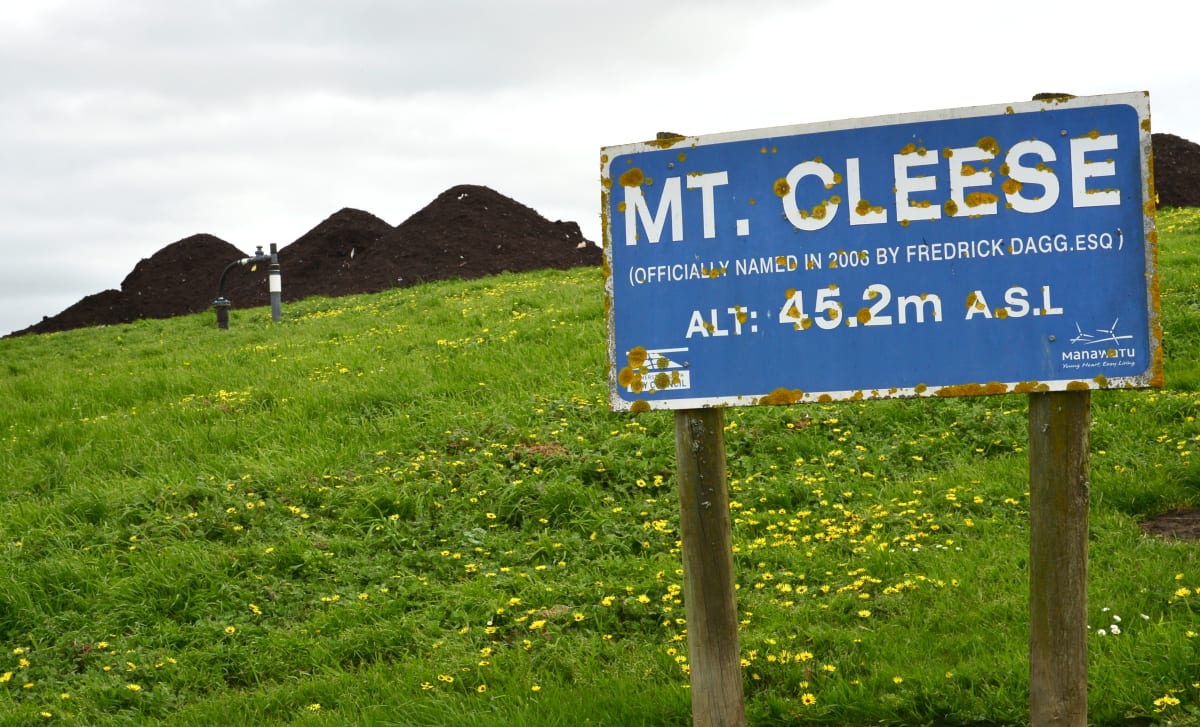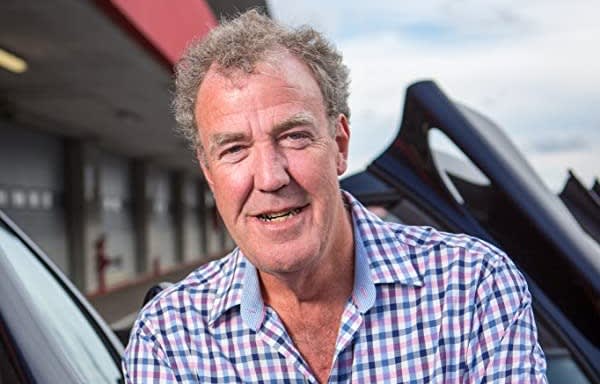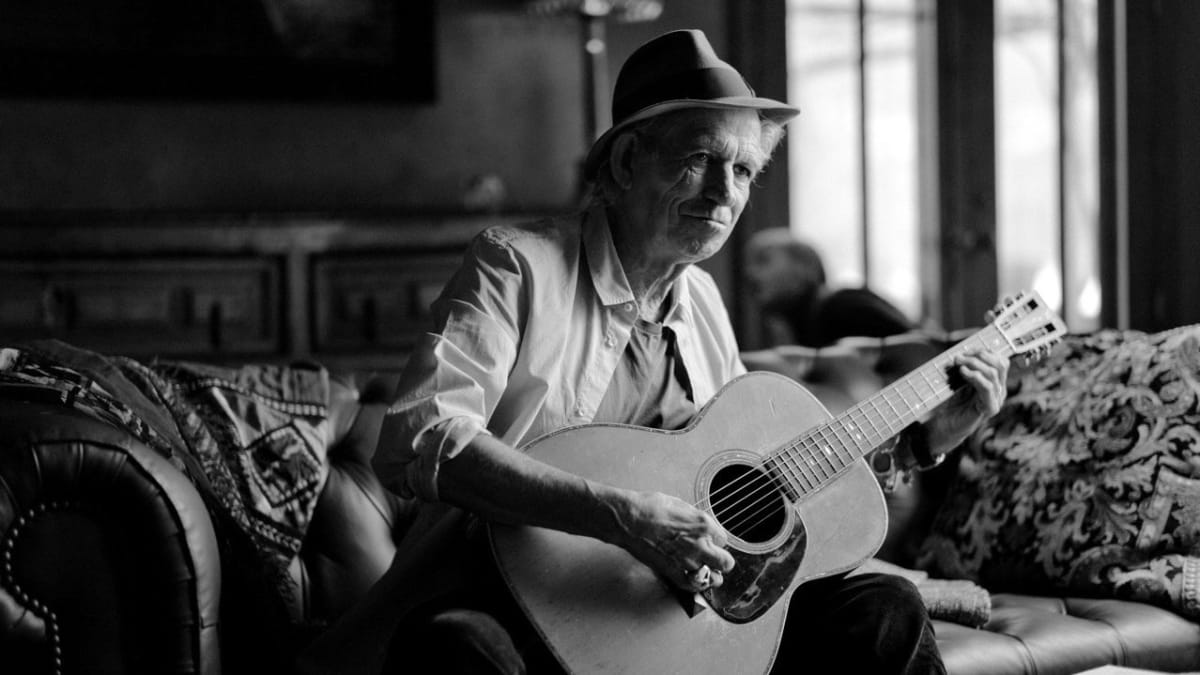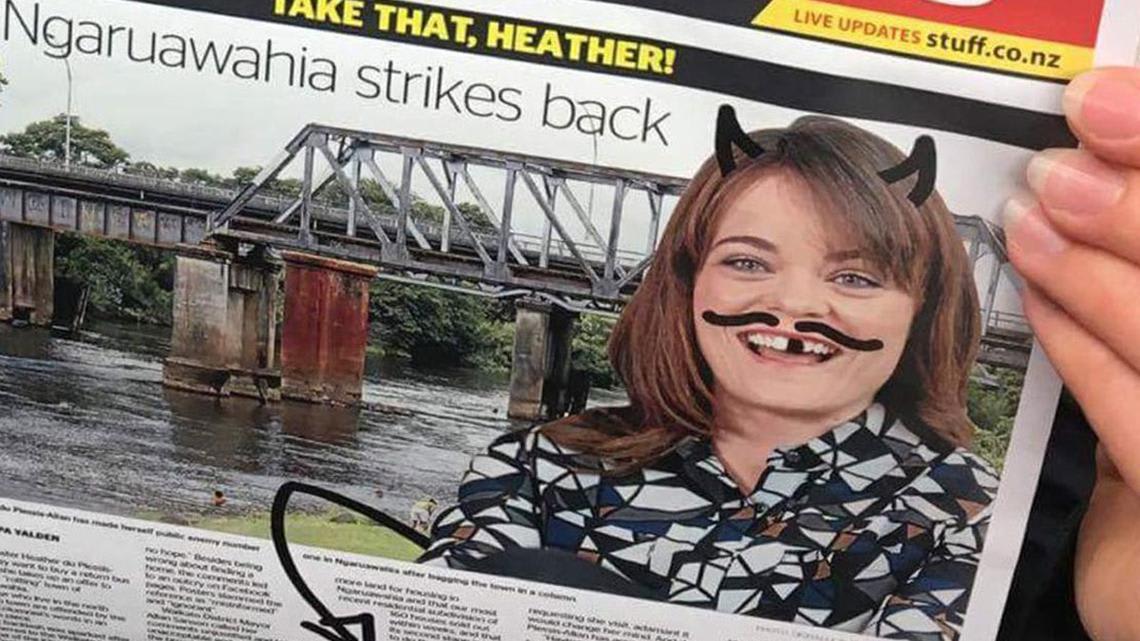
Writing at Newsroom, Jonathan Milne described a capital city of politicians and grey bureaucrats that the rest of NZ loves to hate – so Wellington's new mayor flies him down to wine and dine him and persuade him otherwise
Opinion: When TV and radio funnyman Mikey Havoc sat on a giant trout in 1999 and described the town below as "gay old Gore", locals were so incensed that he was forced to return and put on a free fireworks display to make peace.
That was another millennium, of course. Yet still, small-town New Zealand is easily wound up.
READ MORE:
1/ Why does everybody hate Wellington?
2/ Socks, frocks and saving Wellington from self-indulgence
3/ Rates and old mates – bailing out our cash-strapped capital
That's been the case from 1965 when the Rolling Stones labelled Invercargill "the arsehole of the world", to this century when British comedian John Cleese called Palmerston North the suicide capital of New Zealand, former Top Gear presenter Jeremy Clarkson advised any tourist against visiting Waiheke Island, and newspaper columnist Heather du Plessis-Allan said Ngāruawāhia wasn't even worth pulling over for a pee.
And let's not even get started with failed politician and broadcaster Michael Laws, who used his newspaper and radio slots to variously attack Raetihi ("genetically deficient"), Stratford ("gone by lunchtime"), Dannevirke ("a dump"), Christchurch ("the poor white trash capital") and Whakatāne ("simply the trash capital").
For civic leaders and citizens who feel wronged by the reckless reckons of petulant pundits, there are some options. The mayor of Stratford told his antagonist to pull his head in; Palmerston North named its municipal rubbish dump "Mt Cleese"; the Whakatane Beacon newspaper invited Laws to town for a public debate. (He was too gutless to front.)
I knew all this when I wrote an article ahead of last year's local council elections headlined, "Why does everybody hate Wellington?"
In our training courses on journalism and the law, one of the things we're taught is to preface our more caustic rants with, "opinion". That way there's a chance – perhaps a slim chance – that when we're sued for defamation in court, we can plead honest opinion, m'lud.
I'm not sure that an entire city can sue, but just in case, I was on alert when I received an email from a Wellington official responding to the article. It began: "Respectfully, Sir, we disagree."
The new mayor Tory Whanau could have hit back at my shamelessly provocative write-up. She could have just ignored it (and probably should have).
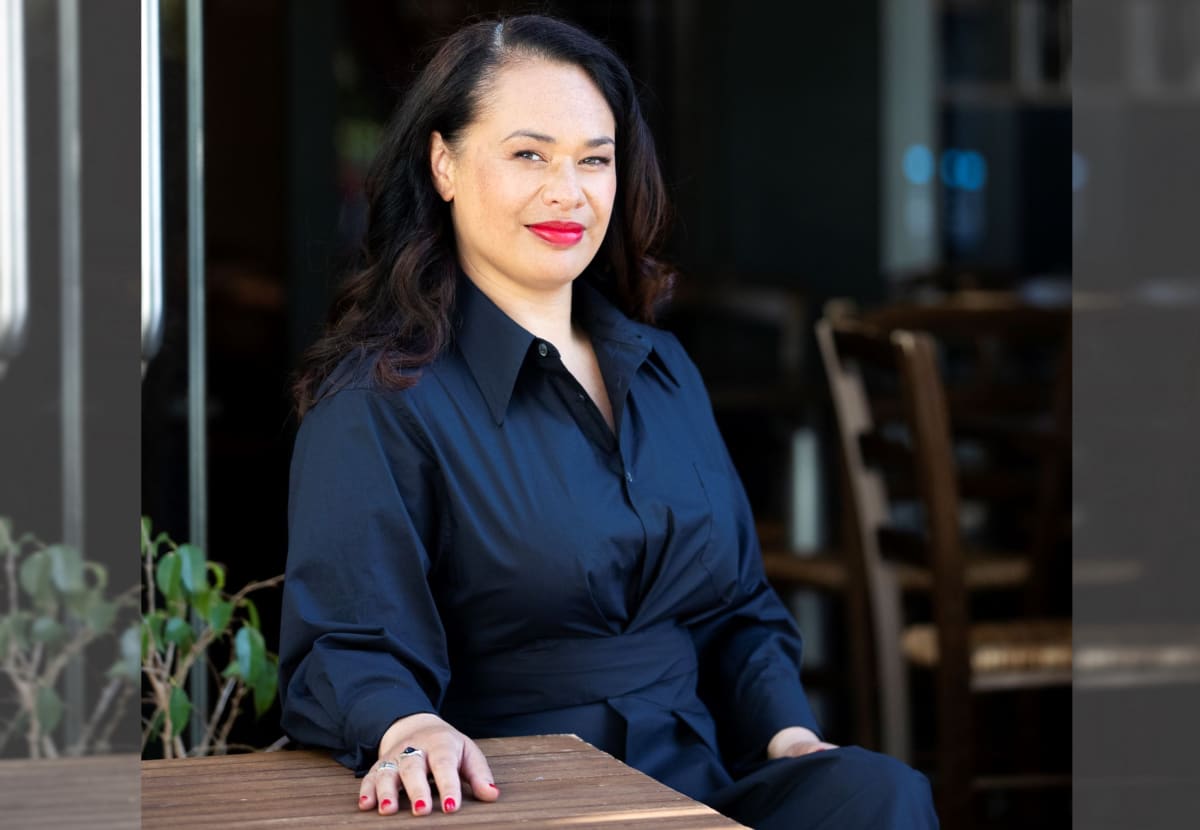
Instead ... she invited me down for dinner. No fights, no fireworks. Just flavourful steamed zhong pork dumplings, duck gado gado and candid conversation upstairs at the casually elegant WBC restaurant in Victoria St, followed by head chef Koen Hogendoorn's excellent Sichuan ice cream, kataifi nest and sesame praline.
[* Disclosure: Jonathan Milne's fine dining, flights and electric bus ride from the airport were paid for by WellingtonNZ, the region's economic development and tourism agency. Walk shorts, socks and styling – journalist's own.]
Why the charm offensive?
Wellington City Council and its executives have been feeling somewhat beleaguered over the past year. Former mayor Andy Foster was forced to commission an independent review of the city’s governance, after tensions between elected members and staff. The findings were critical of Foster’s leadership, finding he had breached the council's code of conduct. There was a lack of clear direction to staff, resulting in wasted time and ambiguity for the city's external partners.
|
|
|
| Smalltown smackdown #1: The American writer and raconteur Samuel Clemens, aka Mark Twain, toured New Zealand in 1895, where he was struck by the Englishness of Christchurch saying, in his sardonic style: "If it had an established Church and social inequality it would be England over again." | |
The new mayor took over a dysfunctional council, and this was not a theoretical or esoteric problem: the problems had nearly derailed the city's $6.4 billion Let's Get Wellington Moving project. The dirty, gritty, violent anti-mandate protests at Parliament ground the CBD to a halt for a month; problems with public transport have slowed the whole region for a year.
Sewage leaks and spouts have caused both mirth and misery. The residential property market is suffering the hardest landing in the country; workers have been evicted from public buildings that aren't up to earthquake standards. City leaders are convinced they are being short-changed by central government, compared to the regional and economic development funding they see being handed out elsewhere in the country.
In June, Wellington tumbled from No 4 to No 50 in the annual Economist Intelligence Unit's index of the world's most liveable cities, which measures indices including healthcare, infrastructure and environment.
It seems the headline on my article – just the day before Whanau was elected – was the final straw. "The reality is we've been through a rough, rough couple of years. And that's true with Covid, that's true with earthquakes, various reasons."
She and her team want to persuade me that not everyone hates Wellington. That, indeed, Wellington is really quite loveable. "It's come back to life over the last few months."
So, does everybody hate Wellington?
The 2022 local elections coincided with the publication of the findings of the big NielsenIQ Quality of Life Survey of 6,900 residents of New Zealand's eight biggest cities. Fifty-eight percent of Wellington respondents said their city had become a worse place to live over the past year.
Though most were still proud of their city, they had become increasingly dissatisfied with central government, with local government, with the high cost of living, with a lack of good housing and amenities, a lacklustre CBD and failing infrastructure.
The once buoyant perceptions of a small vibrant, innovative, artistic, bohemian capital had been marred by several years of Covid, and political infighting over transport and Three Waters infrastructure.
The question in my headline was inspired by a notorious North & South magazine cover story in 1999, asking why everybody hated Auckland.
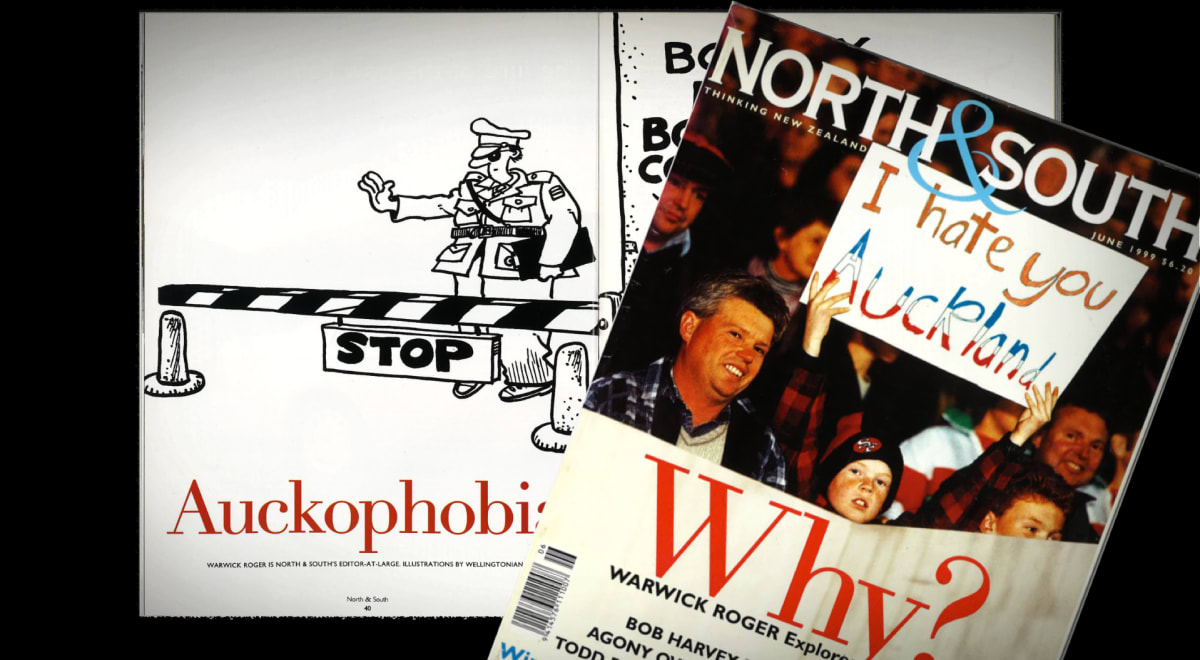
So, I compared, and contrasted:
"Back then, Aucklanders were seen as money market wide boys, guzzling champagne at The Viaduct ...
"Wellingtonians were seen as civil servants in their walk shorts, spilling out of the city's central railway station on clockwork each morning to populate the grey Stalinist office buildings of The Terrace. Nowadays, they're better-dressed."
I did write these words with enormous and pervading insight.
What the mayor and my other critics may not have realised is that I spent most of the first 30 years of my life in Wellington.
|
|
|
| Smalltown smackdown #2: In 1965, the Rolling Stones visited on one of the most far-reaching world tours by any rock band ever. Histories differ on whether it was Mick Jagger or Keith Richards who labelled Invercargill "the arsehole of the world". The city responded years later with an award-winning play, depicting the main characters "facing up to how their own lives have turned out since". | |
It was at Wellington College that I learnt to compare and contrast. It was also there that I learnt to wear grey creased wool and polyester shorts, and knee-high socks held up with elastic bands.
In 2004, still in Wellington as political editor of the new Herald on Sunday, I obtained an Auckland Council briefing paper on restoring the capital to the Queen City, and the "severe negative impact" that would have on the dependent Wellington economy.
"Wellington tends to operate as a bureaucratic vacuum cleaner for taxpayer money," said the Auckland mayor of the day, John Banks. "And there's very little production comes out of Wellington, useful production, including Hansard."
I argued that, as a compromise, Wellington should keep its public servants in their concrete office blocks, but Auckland should be the big capital that embraces the world. Wellington might be the head of the nation; Auckland could provide the heart.
By 2009, the last big corporates were packing up their desks and spinny-chairs and moving their HQs north. Wellington (population 194,000) had lagged to sixth place in New Zealand's population rankings, gradually becoming this country's answer to characterless Canberra.
| Smalltown smackdown #3: Years after Mikey Havoc and Jeremy 'Newsboy' Wells called Gore the "gay capital of NZ", conservative locals remained offended. The mayor warned they'd be run out of town if they ever returned; a local rugby star drunkenly threatened to punch out Havoc in a pub. Eventually, they returned and put on a free fireworks display to make peace with locals. | |
So worried politicians gathered at Parliament in Wellington and with overwhelming cross-party support, passed a bill to juke the stats. They merged Auckland (445,000), Manukau (369,000), North Shore (226,000), and Waitakere (205,000) into one 140km long super city, in order to artificially restore our capital to the medals podium.
As for me, I joined the exodus. I left Wellington 18 years ago. I've since lived in compelling, cosmopolitan London; in lovely, luxuriant Rarotonga; in sunny, smart, sophisticated Auckland.
I've had neither the interest nor the inclination to ever move back to Wellington. I wrote in October's contentious article:
"Wellington's problem (or at least, one of its problems) is that its name has become shorthand for central government decision-making – and a perception that the Government is seizing back control from local communities."
Walking the talk
Ahead of my dinner with the mayor, it seems appropriate to show my open-mindedness to Wellington, Wellingtonians and their culture – a culture that was described as distinct by some council candidates surveyed and interviewed for my previous article.
"The Wellington culture that has alienated Kiwis is not geographical in nature, but ideological," claimed Robert Eady, a Far North District Council candidate.
Newsroom had surveyed council and mayoral candidates the length of the country; by contrast to government, it showed 60 percent identified themselves as economically right-of-centre. Half would reduce or freeze rates.
|
|
|
| Smalltown smackdown #4: In 2006, British comedian John Cleese called Palmerston North ‘the suicide capital of New Zealand’ on his website. "If you wish to kill yourself but lack the courage to, I think a visit to Palmerston North will do the trick," he elaborated. Palmy responded by officially naming its rubbish tip ‘Mt. Cleese’. | |
"Over the 21 years I have been a councillor I have experienced the bureaucracy serving central government overwhelming local government with unfunded mandates and treating them like inferior partners," said Carterton District Council candidate Jill Greathead.
I am determined to show open-mindedness to Wellington and its civil service heritage – so I pop into the rather wonderful Ziggurat secondhand store on Cuba St, a 40-year-old Wellington institution.
There, shop assistant Beth Tibbo is delighted to share and celebrate the history of the sartorial combo that is the tight walk shorts and knee-high socks.
"A way that we can visualise the public service, or a slightly cliched take on it, is the classic guy striding out of the Wellington Railway Station in about 1975, wandering across to the Ministry of Works with his powerful look and powerful thighs. Wellingtonians are renowned for their knees!" – Ian Wards, Wellington Museum
This uniquely Kiwi attire is believed to be a legacy of New Zealanders' wartime service in Egypt and North Africa, where they wore baggy Bombay bloomer khaki drill shorts with socks and boots.
On their return, this was adopted by farmers (Tibbo remembers her grandfather and father wearing them with Red Band gumboots) but also, more incongruously, by office workers.
As early as 1946, the Public Service Association was making representations to the State Services Commission to allow the wearing of shorts for public servants working in "hot humid climates such as Napier, Gisborne, Auckland and Whangārei".
The Commission agreed provided the male officers were working away from the public. Eventually permission to wear white, grey or fawn tailored shorts, with a white shirt and white socks, was extended to civil servants nationwide.
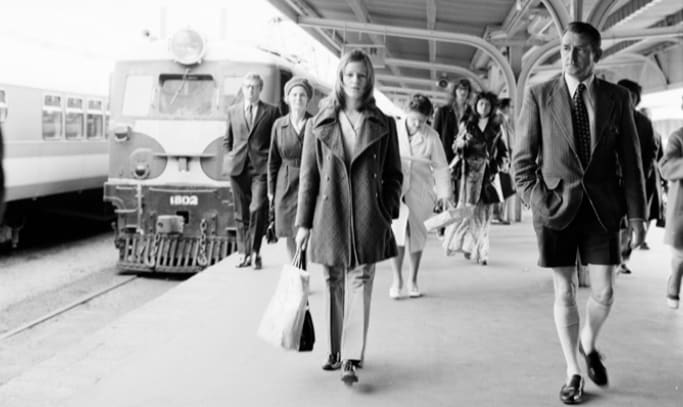
In the 1960s and 70s, more than 160,000 pairs of walk shorts filled the racks in menswear stores. By 2014, the PSA was ready to "apologise unreservedly for its part in this fashion crime".
Yet in the past few months, there have been calls (the PSA among them) to bring back walk shorts and socks. Morning Report host Corin Dann was wearing them, and Wellington Museum senior curator Ian Wards is calling for genuine walk shorts, socks or shirts belonging to Wellington-based public servants (email collections@experiencewellington.org.nz if you can help).
"So many Wellingtonians are public servants but, somewhat by design, the public service is fairly anonymous," Wards tells RNZ.
"So a way that we can visualise the public service, or a slightly cliched take on it, is the classic guy striding out of the Wellington Railway Station in about 1975, wandering across to the Ministry of Works with his powerful look and powerful thighs ... Wellingtonians are renowned for their knees!"
Walk shorts and Wellington – the rise and fall
Tibbo is delighted to help out. We browse the shelves through pairs of shorts that I'd consider wearing – but they all lack the authenticity of the classic walk shorts.
It's only when we cross out of my comfort zone into shorts I feel I'd never be seen dead in, that we come to a single blue-grey pair that are a little too short, a little too tight, a little too pressed ...
Against my better judgment, I try them on. They're awful. They're perfect.
Then Tibbo reaches under the counter. She has one pair of authentic knee-high white socks, still sealed in their original polythene wrapper. Partnered with a shirt and tie, and a pair of leather business shoes, I'm a sight for sore eyes.
|
|
|
|
Smalltown smackdown #5: Former Top Gear presenter Jeremy Clarkson visited Waiheke Island several times, but the aftermath was vexed. The managing director of the luxury resort Waiheke Unlimited told media that Clarkson demanded the helicopter fly errands to pick up cigarettes, gravy mix and a game of Monopoly. Clarkson replied: "I did ask the helicopter pilot if he'd get me a game of Risk. Much better than Monopoly. He offered to get gravy as well. I declined." And he continued: "My advice to anyone wishing to visit Waiheke Island is: don’t." |
|
Could walk shorts and socks come back into fashion again? "Personally, I live in Wellington, I work in Cuba St – I believe anything is possible," Tibbo says. "I hope it could happen!"
In 2022, for the first time, NielsenIQ's Quality of Life Survey asked its nearly 7000 respondents in the country's biggest cities about whether they feel comfortable dressing in a way that expresses their identity in public.
A whopping 80 percent of Wellingtonians said 'yes'. That's significantly higher than anywhere else, incorporating sexual, gender, ethnic, cultural or faith identity – and, I'd argue, something more.
Perhaps Wellington has invented a new counter-culture. The bureaucracy has become so uncool, it has suffered such sneering from the rest of the country, that its members have united in a community. What was the mainstream is now the new alternative.
Crumpets and trumpets
John Allen is the very model of that modern civil servant. He's careful, he's safe, he's anonymous, he initially seems like somewhat of a grey man. On the uncharacteristically sunny summer morning that I meet him for breakfast at Prefab Coffee Bar, he's wearing a jacket and tie.
But when I challenge him on this, his eyes twinkle and he takes a sip of his coffee. "I've always said that a tie is actually now a sign of non-conformity, a sign of rebellion. You're not any longer following the pack."
A former chief executive of state-owned NZ Post, then Secretary of Foreign Affairs and Trade, Allen is now chancellor of Te Herenga Waka Victoria University of Wellington and heads WellingtonNZ, the region's economic development and tourism agency.
WellingtonNZ is tasked with enhancing prosperity, vibrancy and liveability across the region. Among other things, it operates venues like the TSB Arena, the Opera House and the Michael Fowler Centre. (And did I mention, it flies hungry journalists into town to feed them three square meals?*)
|
|
|
| Smalltown smackdown #6: In 2010, Keith Richards reprised the Stones' slur against the south in his memoir Life – but this time turned his attentions to Dunedin. "My God, there are some black holes ... Dunedin, for instance. It looked like Tombstone and it felt like that. It still had hitching rails. It was Sunday; a wet Sunday in Dunedin in 1965. I don't think you could find anything more depressing anywhere. Dunedin made Aberdeen seem like Las Vegas." | |
Allen is "not the slightest bit fazed" at this Auckland journalist judging him on how he dresses. "You've been stalking me on my social media, haven't you?" he laughs. "You've seen that classic shot of me in my walk shorts and long socks."
There's more to this counter-culture. Allen's civil service compatriot, Sir Ashley Bloomfield, famously recognised the severity of the Covid outbreak while attending the New Zealand Pipe Band Championships in Invercargill in March 2020; similarly, John Allen has just given the keynote speech to the Brass Band National Championships. These are brave and risky cultural statements.
"My core message was that the role they play, and other musicians and poets and writers and performing artists and visual artists play, in creating the vibe of this place, has a value beyond simply the audience that they attract to a particular event or show."
Allen's discovery at band camp was somewhat less seminal than Dr Bloomfield's; he learned that brass band players would rather be out the back drinking beer than in the auditorium listening to speeches. It's an important discovery for me, though, because it means WellingtonNZ sends me down to taste beers at the city's Garage Project brewery, rather than sending me to a brass band performance, thank the stars.
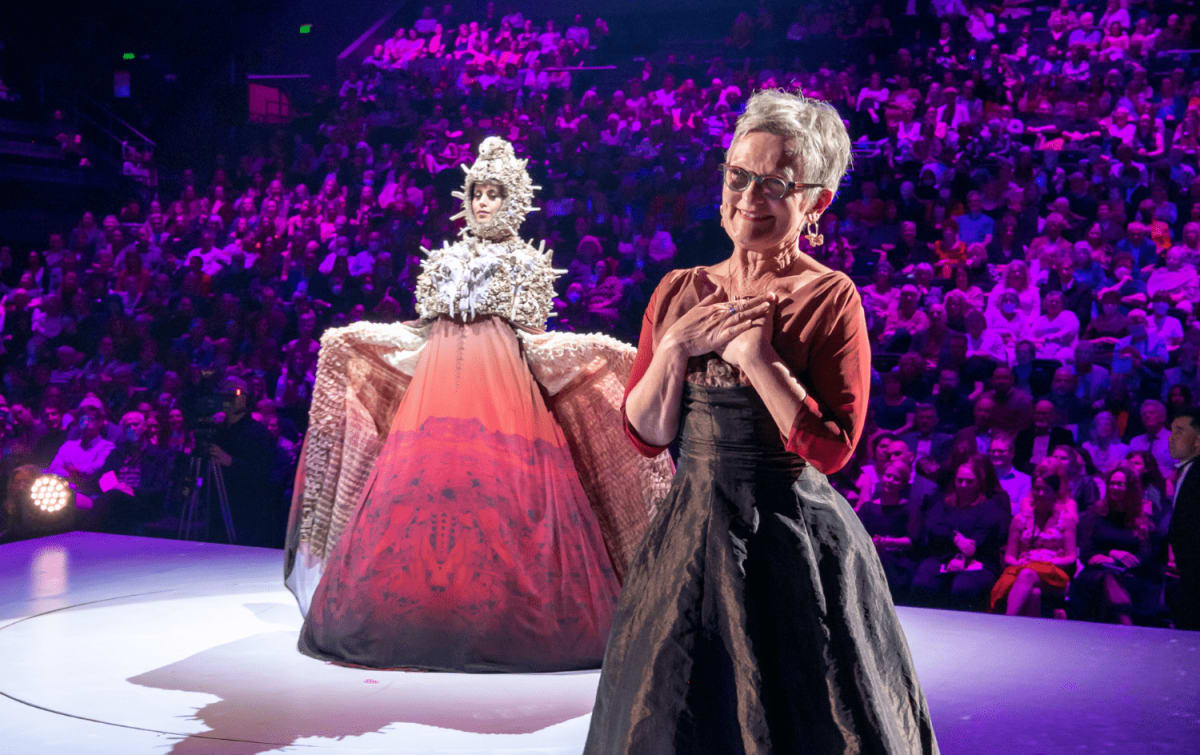
The city wants to remind the rest of New Zealand of its leadership in tech, innovation and the arts (not just brass bands).
"We believe that Wellington continues to contribute hugely to the success of this country, and we want people to understand that the stereotypical views of our city – which are your walk shorts or your Gliding On or whatever bureaucratic perspective – are simply outmoded and outdated," Allen says.
"When people traditionally think about Wellington, they traditionally think about it as a place of bureaucracy, and that's a pejorative term in some people's brains rather than a place of world-leading policy development. But leaving that aside, the truth of our city is increasingly that its economic heart is in tech, is in film, is in that creative space."
READ MORE:
1/ Why does everybody hate Wellington?
2/ Socks, frocks and saving Wellington from self-indulgence
3/ Rates and old mates – bailing out our cash-strapped capital
TLDR: Lord of the Rings, Wētā Workshop, Pik Pok, Dinosaur Polo Club, Xero, Humble Bee Bio, Sharesies, Fix & Fogg, Garage Project, Antipodes NZ, World of Wearable Art, Steven Adams, Flight of the Conchords, Taika Waititi, Fat Freddy's Drop, Fly My Pretties ... and in the news this week, Prince Harry's nemesis Dan Wootton.
"In a 10 minute walking distance from where we are sitting, here, we could visit something like 100 tech companies at various stages of their sort of growth and evolution. That's the reason they're here, that community and support.
"I know to an Aucklander, 100 doesn't sound like a whole lot. I understand. But the truth is, it's driving a huge amount of economic activity of this city."
|
|
|
| Smalltown smackdown #7: In 2016, Heather du Plessis-Allan wrote in her Herald on Sunday column that the town of Ngaruawahia was rotting and she wouldn't stop to pee there. Locals hit back on social media, telling her how "misinformed" and "ignorant" she was. The radio talkback host tweeted her copy of the front page of the competing Waikato Times, with devil's horns drawn on her head. So the mayor took her for a tour of the town – and she obligingly posed for a smiling photograph trying a local steak and cheese sandwich. | |
One complication is that tech firms are moving offshore, or at least threatening to do so. Xero is now listed on the ASX, and has delisted from the NZX. The country's biggest game company PikPok has opened its new studio in Colombia instead of its Wellington hometown (more on Newsroom, next week). The Game Developers' Association says other firms are moving overseas because of New Zealand's failure to match tax incentives across the Tasman.
Another is that the celebrated arts sector survives on the smell of an oily rag. For instance, the Royal NZ Ballet, headquartered at WellingtonNZ's St James Theatre, announced in 2021 that it had increased dancers' pay – to the living wage. It seems extraordinary to boast that New Zealand's best dancers, who are the faces of some of the region's marketing, are paid so little!
"Obviously, part of the reason that we're keen for you to come down now is because the experience of the lockdown and the photos that have gone round of the protests and that sort of thing has caused many people to think differently about this place," Allen says.
"This city's moved a long way from Gliding On, Roger Hall's fabulous play. We are a very diverse place. It is a place where people are encouraged to celebrate themselves with their own personalities. And you're right, there's a lot of flamboyance, and there's a lot of creativity."
(For the avoidance of doubt, Newsroom, its journalists and its editors did not and would not apply the word 'flamboyant' to Wellington; that one's entirely on John Allen).
Allen believes that Wellington can reclaim and reimagine the trappings of central government and bureaucracy for the 21st Century, but more, he argues that Wellington's future is bigger than government.
"I accept the challenge of repositioning and re-presenting Wellington in a contemporary context. And I accept that being a capital city, and that defining us, is both a blessing and also a challenge. But I'm up for that challenge. I think that the city is a hell of a lot more than government."
Determinedly unfazed, he continues his argument for a bureaucracy of non-conformity. "If you're wearing walk shorts today, then you're making a statement."
So, I do. I acquire and don my walk shorts and high socks, and set about embracing the counter-culture.
And as I walk through Wellington's CBD this fine day, people seem friendly. They smile at me.
Lean into it
Just across Cuba St from Ziggurat, after dodging around several dozen bright orange road cones, is Julie Clark's award-winning restaurant, Floriditas.
At our table overlooking Marion Square (now an asphalt carpark) and those road cones, Beth Brash politely resists commenting on the walk shorts. Indeed, she averts her eyes entirely. Instead, Brash takes me through the menu of seasonal specials and perennial favourites.
I opt for the green eggs ’n ham (honey-glazed ham off the bone, asparagus, parsley hollandaise and two poached eggs on sourdough*) and an esoteric discussion of what really distinguishes Wellington's culture. If it's not the overbearing regulation of central government; if it's not grey bureaucrats in their shirts and ties; if its tech and innovation sector is either migrating offshore or threatening to do so; if its food and arts and culture are good but hardly unique – then what is it?
"I love road cones. That’s progress, that’s advancement, that’s getting shit done!" – Todd Barberel, WellingtonNZ
Brash is the programme manager for Wellington on a Plate and its various foodie fantasy spin-offs. She loves the city's size and cohesion – but can also see that for some of us, it's too small. It's a town where everyone knows everyone else, and their business.
I call it the Wellington twitch: You can't gossip about other people, without nervously checking over your shoulder to be sure they're not sitting behind you on the bus, or in the café.
"You need to learn not to bitch, and instead just relax and appreciate the coffee," Brash reprimands.
She pulls out a quote that she carries about with her, on her phone. It's a line from a poem by the late Lauris Edmond, that is also immortalised on one of 23 stone plaques along the Wellington Writers Walk, running along the waterfront from Kumutoto Stream to Oriental Bay.
It’s true you can’t live here by chance,
you have to do and be, not simply watch
or even describe. This is the city of action,
the world headquarters of the verb –
Brash has her own way of describing it, that seems strangely apt to the self-anointed Windy City. "When you can't rely on the weather, you have to be a doer," she says. "You lean into it – you can't just rely on going to the beach."
Kicking out the crutch
I resume my walk through central Wellington. Passing pedestrians and e-scooter riders really do smile quite broadly and openly at me. In fact, they laugh ... and I have the disturbing realisation that they're not looking at my face, they're looking at my knobbly white knees.
I'm not sure I share Wellingtonians' comfort about dressing in a way that expresses my newfound identity in public.
At dinner, I complain to Tory Whanau. She, too, laughs. "People do wear jandals in Wellington," she insists.
She acknowledges the legacy of walk shorts and socks. "You walked down Lambton Quay," she says. "Well yeah, bureaucrat central. I can't lie, they're a massive contributor to our local economy."
But she says the city is changing – not just culturally, but also economically.
If ever it leaned on central government jobs and revenues as a crutch, that will no longer be possible.
READ MORE:
1/ Why does everybody hate Wellington?
2/ Socks, frocks and saving Wellington from self-indulgence
3/ Rates and old mates – bailing out our cash-strapped capital
► Jonathan Milne visited courtesy of WellingtonNZ, the region's economic development and tourism agency.
